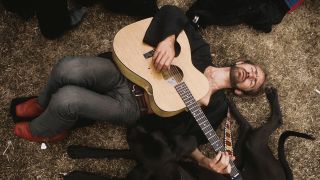For his fifth album, Roy Harper immersed himself in the possibilities of the recording studio for the first time. Comprising just four songs and primarily driven by six- and 12-string acoustics, Stormcock was an often fierce masterwork that took aim at religious dogma, war, the judicial system, big business and even pesky rock critics.
It also featured a certain S. Flavius Mercurius, aka Jimmy Page, on the epic brilliance of The Same Old Rock.

What do you remember about the album sessions?
Roy Harper: All of my other records until then had been made very quickly. The Sophisticated Beggar [1966] was virtually made in a day. The next one [1968’s Come Out Fighting Ghengis Smith] was done in three days and so was Folkjokeopus [1969]. The fourth album, Flat Baroque And Berserk [1970], which I did at Abbey Road, was where I was spreading my wings and finding out exactly what could be done. I saw a different light at the end of that record. So I wrote Stormcock because I felt the time was right for me to do what I really wanted.
Jimmy Page’s guitar solo on The Same Old Rock is apparently your own personal highlight of Stormcock.
He’s so intuitive when it comes to the things he loves. He finds things he can identify with. And that’s what he did with that song. It was just an atmosphere he created. Jimmy elevated it into something else entirely. At the beginning of Led Zeppelin I think he suddenly found he could do things that were different. It was exactly the same with me. As I was coming into the making of Stormcock I realised there were other places I could go to quite easily, without a moment’s thought.
Is Me And My Woman the most directly personal song on the album?
In my mind that song is always the question: me and my woman – what are we doing on this planet? Are we part of the ongoing fauna and flora, or are we likely to last very much longer? If we’re going to have longevity on the planet, we have to find ways to live that are more controlled than they are now. I was thinking about maintaining this shape in society for a very long time and making this point when I wrote it in 1970. It’s now over forty years later and people are still asking the same question, but it’s actually got a lot closer to the bone now. And it’s a question that remains unanswered.
Is it true that the song is also about your first wife?
Partly. When I sing the chorus I have her in mind, but that’s not what the song is about. Your own interpretation of it is always there, but I automatically couch things in an amount of generality that can’t be pinpointed to one event. In order to remain current, songs have to pertain to what’s happening in a modern sense. When I sit down to write, the number-one consideration is timelessness.
Is Stormcock your finest moment?
It’s definitely one of my high peaks. Unfortunately the record company, who came in once or twice to listen, made almost flattering noises then went away. I knew they weren’t satisfied, because they wanted a single and there was no single appearing. So before the record was finished it was outlawed. Anything that was selling in millions they got behind, but they didn’t want to break new ground. And after that I was effectively marginalised by EMI.
Did that disillusion you?
I was incredibly disillusioned. I was distraught, to be honest. I knew that if Stormcock had been taken at face value it was a revolution in itself. And it was a new direction for people to look at. Of course it wasn’t everybody’s cup of tea, but it would have made a lot more noise than it actually did at the time. They buried it. If Stormcock had been successful I might well have become a megalomaniac, but I don’t really think it would’ve changed anything.
Being marginalised has had its strong points. I’ve probably survived longer because of it. Shortly after Stormcock I was hospitalised anyway, and was told I had seven years to live [he was diagnosed with a rare genetic condition called HHT, which affects the lungs, liver and brain]. That was a sobering thought. I’m very grateful to have outlived that, and for the album to have come back into an era where it’s accepted again. I polarised a lot of people, and I still do. There’s a huge difference between me and my contemporaries, in some ways.


